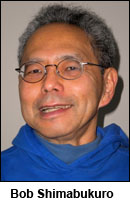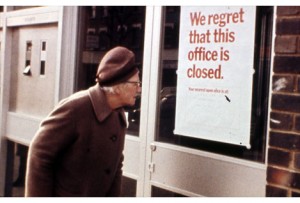OPINION
Social Security already being cut; Seattle residents denied access
 By BOB SHIMABUKURO
By BOB SHIMABUKURO
(July 12, 2013) — Because of the continuing trend of downsizing government at the expense of those who need help the most, many of our grandmothers, grandfathers, aunties, uncles, sons, daughters, grandchildren, families and communities are being shortchanged of their fair share of Social Security benefits. That’s what I conclude when I look at a report of the effects of the consolidation of Social Security Administration (SSA) field offices into the newly formed Seattle Metropolitan Office in the Jackson Federal Building (JFB) last year.
The report, based on Social Security visitor intake data, was analyzed by a coalition of concerned community and labor organizations, including leaders from Asian Counseling and Referral Service (ACRS), OCA-Greater Seattle, InterIm Community Development Association and Puget Sound Advocates for Retirement Action (PSARA). The report paints a picture of barriers that discourage people from services to which they are entitled. Yes, entitled to, because they or someone in their family paid for it. Consolidation of Social Security offices happened because the government had to downsize and save money. Serve less people, save money, too. How bizarre is that? (And how different is this from making people wait six hours to vote?). Social Security cuts in order to save money makes it difficult for people to get what’s really theirs. Any other situation like that would be called theft.
As you might expect, this is what we got from the the Social Security data:
The number of visitations to the newly consolidated Seattle Metropolitan Social Security office dropped dramatically by 24 percent over all. There were 1,373 average weekly visitations at the Chinatown-International District (CID) and Belltown SSA field offices before the move. After the move to the Metropolitan Seattle office in the JFB, there were 1,038 average weekly visitations — or 335 less each week — a 24 percent decrease. Projected over a year, that’s 17,420 less visits per year.
Seventeen thousand four hundred and twenty less visits a year. I wonder where the money saved went.
We also got this:
 Ninety-seven average Limited English Speakers’ (LES) weekly visits at the two SSA field offices before consolidation, which dropped to 39 average weekly visits at SSA at JFB — or 58 less a week, a 60 percent drop.
Ninety-seven average Limited English Speakers’ (LES) weekly visits at the two SSA field offices before consolidation, which dropped to 39 average weekly visits at SSA at JFB — or 58 less a week, a 60 percent drop.
A 60 percent drop in LES weekly visits, 58 visits less a week, 3,016 less visits annually. I wonder what happened to the people who stopped going to an SSA office? Was the downtown office unable to accommodate their needs? Do clients feel too uncomfortable at the downtown office to ask for what they need? Do clients no longer need as many services from SSA?
Given these numbers the SSA offered the possible explanation that more people were using phone and Internet services — highly unlikely, especially for people who have language difficulties.
Demographic information on the area served by the International District office: of the 35,528 households in the area, 7,093 households had incomes less than $15,000; 2,189 households had no phone, and 37.2 percent are Asian or Pacific Islander, 29.6 percent are African American and 1.5 percent are Native American. Thirty-seven percent are from cultures in which English may not be their first language.
In an April 2013 survey, the coalition collected opinions on the consolidation from 144 clients ACRS, Chinese Information and Service Center (CISC) and InterIm. Only two respondents indicated that they spoke English. Of the 110 who responded to a computer usage question, 108 reported that they do not use the computer to access services from SSA. Only two indicated that they do.
Almost 89 percent respondents had been to the CID SSA office before it was closed (128 out of 144); only 66 respondents (46 percent) have been to SSA in the JFB. In response to an additional suggestions/comments question, 72 asked for better translation services, 33 for more efficiency (more staff, shorter wait time, increased office hours, clearer answers to questions), and 30 asked for a more friendly environment (combination of “more friendly environment” with “no security check”).
So we know what’s important to this population. They want to understand what’s going on, and they want a place where they can feel comfortable. JFB does neither.

The Jackson Federal Building in Seattle
Many of us know the Jackson Federal Building. It’s intimidating. Even more so when there’s some demonstration going on there. It’s on a hill — a killer for Grandma and Granddad, and me, too. There’s no more free bus transportation to and from the building and the CID, and only expensive parking is available.
And as the report says: “It’s a maximum security building, with armed guards, metal detector screening, requirements to remove outer clothing, and requests for identification, all of which can be deterrents to visits.”
I’ll say. Almost all of my siblings would or could not go there — unless they absolutely had to. Even then, I don’t think they would. They would ask me to go for them. I would, too, for the older ones especially. But we shouldn’t let Social Security treat them this way.
A broad-based, racially diverse group is working to bring back an accessible office for Social Security recipients. We all need to lend a hand. Stay tuned.
As I said before, grandmothers, grandfathers, aunties, uncles, sons, daughters, brothers and sisters are being shortchanged. Let’s put a stop to this. We should be demanding a more accessible, convenient central Seattle SSA office.
Bob Shimabukuro is on the Executive Board of the Puget Sound Advocates for Retirement Action and is Associate Editor of PSARA’s Retiree Advocate newsletter. This opinion column appeared in the International Examiner and is reposted here with the author’s permission.





